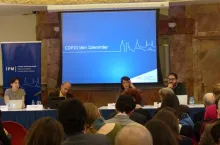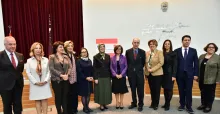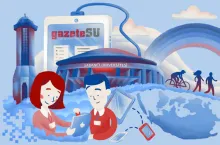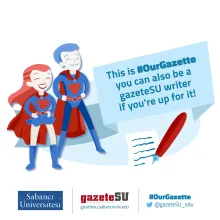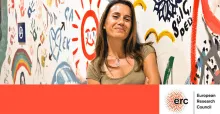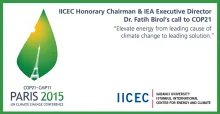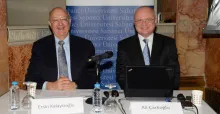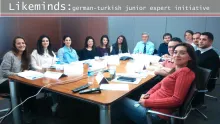22/12/2015
The Istanbul Policy Center (IPC)-Sabancı University-Stiftung Mercator Initiative hosted a panel discussion titled "Impressions of the Paris Climate Conference 2015 – COP21." Held in the Karaköy Minerva Palas building of Sabancı University, the panel's speakers were IPC Senior Specialist Ümit Şahin, 2014/15 Mercator-IPC Fellow Ethemcan Turhan, 2015/16 Mercator-IPC Fellow Hande Paker and Sabancı University CDP Turkey Project Manager Mirhan Köroğlu Göğüş, who followed the summit in Paris. All four speakers shared their impressions and observations during the Paris Climate Conference 2015 – COP21 held in Paris between November 30th and December 12th.
Speaking first, Ümit Şahin had the following to say about COP21: "Sabancı University took part in the COP21 as an accredited institution this year. As Istanbul Policy Center, we organized a side event on the report titled "Ways of Low-Carbon Development for Turkey" prepared in partnership with WWF Turkey on November 30, and a press conference on the Coal Report on December 9. This was an opportunity for us to express our recommendations and criticism regarding Turkey's policies and negotiating position in the Paris Climate Conference.

Compared to the previous events, the Paris Conference was livelier than most, but it was still less busy than we expected. This may be partly due to the French government enacting martial law and banning all civilian demonstrations in the aftermath of the November 13 attacks. However, attendance was still very high and it was stated that 30,000 participants registered to the official part of the conference, including 10,000 from civil society organizations.
The Paris Convention as the outcome of the Paris conference was hailed as a great success in the press. This may be due to two reasons: Many were not expecting an agreement to come out of Paris so there was notable pessimism among people; or, the media is not a close follower of these topics. It is important that the Paris Convention has been adopted, but it must be said that the success story is a commissioned one. In fact, it is possible to argue that the insistence of the UN and France as the host of the organization on this being a success story is a political maneuver at attempting to conceal the shortcomings of the convention. Nevertheless, considering that the shock of the collapse of the Copenhagen summit in 2009 has been overcome and a new agreement to replace the Kyoto Protocol has been reached, this is also an important turning point. Furthermore, this agreement is the strongest statement that climate change is a serious threat, and the claims of climate change deniers, particularly the right-wing segment of the United States, that climate change does not exist or is not human-caused have been refuted.
The Difference between the Paris Convention and the Kyoto Protocol
The main difference in the Paris Convention is that, unlike the Kyoto Protocol, a maximum temperature increase target was established. An agreement has been reached to keep global warming at 2 degrees centigrade, preferably at 1.5 degrees, and the global increase is already at 1 degree. Another difference from Kyoto is the assessment of reduction targets by a carbon budget approach. In Kyoto, there was a target of reducing greenhouse gas emissions by 5% on average, but this was not calculated by carbon budget. According to this mode of calculation, the maximum carbon dioxide that can be emitted to the atmosphere worldwide until the year 2100 is 1000 gigatons if warming is to be kept limited to 2 degrees. This kind of guide is an important development to measure whether reduction targets work. Moreover, the Paris Convention creates a universal climate regime in which all 195 countries participate, not just developed countries. It is also significant that all parties submit their own plans to combat climate change by way of Intended Nationally Declared Contributions (INDC) as opposed to an imposed reduction target. This was also the first time concepts such as climate justice and mother earth were included in the convention.
Issues in the Convention
The greatest shortcoming of the Paris Convention is that it will not stop climate change. Although the convention speaks of 2 degrees, and even 1.5 degrees, the national reduction targets in INDCs are so inadequate that they will take warming up to 3 degrees. Even if the agreement itself is binding, the emission reduction targets in INDCs, which are annexed to the agreement and constitute a substantial part of it, are not. Even though the Kyoto Protocol was a binding climate agreement, Canada had withdrawn from it and faced no consequences. Unless a clear sanction is imposed, for example, a climate court is established, no change can be expected. Nevertheless, the emission reduction targets in this agreement are even less binding.
Another issue in the Paris Convention that there is no target to decarbonize the economy until 2050. The Convention establishes a target to achieve carbon neutralization in the second half of the century (which is a long period between 2051 and 2100), yet in the absence of a functioning negative emission technology, it is not clear how neutralization will be achieved and when this objective will be fulfilled.
What Needed to Be Done
What really needed to be done with this agreement was to impose a revision of the current INDCs that determine national emission reduction targets until 2020. However, countries are now able to continue with the current targets until 2025. This may cost the world another 10 years. Turkey's most difficult task will be to undertake serious scientific studies to revise its INDC until 2018 and end the trend of growth based on increased fossil fuel consumption. Another precaution against being locked into a carbon infrastructure may be to cancel or suspend all new coal-fired power plant licenses until a new INDC is issued and the Paris Convention becomes effective in 2020."
Ethemcan Turhan had the following to say about COP21: "One of the key issues leading up to Paris was relevant to Turkey as it was on the differentiation between developed and developing countries. However, this differentiation remains limited to diplomatic language and it is unclear who will fulfill common but differentiated responsibilities, and how. Under these circumstances, the Paris Convention seems to be acting on the differentiation in the annexes of the 1992 UN Framework Convention for Climate Change, even though it does not reference them.
One of the discussions on Paris was on the financing of developing countries that are affected by the impact of climate change by those countries that have caused climate debt, or those which have completed their development using fossil fuels in earlier years, thus using up their fair use quota of the atmosphere. The Paris Conference officially resolved to create a climate finance pool of 100 billion dollars per year after 2020, which was a recommendation in Copenhagen in 2009. Green Climate Fund (GCF), Adaptation Fund (AF) and Least-Developed Countries Fund (LDCF) are some of the mechanisms that will transfer these funds to developing or least-developed countries. Nevertheless, since Turkey is a developed country by status –at least in the current form of the agreement– the country is only eligible for the Global Environment Fund (GEF). COP21 president and French foreign minister Laurent Fabius stated that, upon Turkey's request, negotiations will be held on Turkey's unique circumstances until COP22 to be held in Morocco in 2016.
It must be noted that climate finance is not an aid or alms, but a right. Therefore, this fund must be interpreted both as support for reduction and adaptation, and as indemnification paid for previous damages. It is particularly striking that, due to pressure from the US, this part of the agreement contains provisions that this mechanism will not create any liability or indemnification. From the US perspective, such a provision was required because it was predicted that the convention would not otherwise be ratified in the Congress, where Republicans are the majority. On the other hand, the climate finance agreed in Paris must be given in supplement to the Official Development Aid (ODA) already provided. There is a risk that the current development aids provided by bilateral and multilateral mechanisms (which must be equal to 0.7% of the GDPs of OECD countries) can be green-washed and presented as a distinct fund, which requires further attention to the issue.
The Paris Convention is a significant diplomatic achievement but the biophysical limits of the planet do not care about relative development and diplomatic success. Current contributions and sanctions will not suffice to limit climate change to 1.5 degrees. Countries must take more realistic and scientifically endorsed steps. Although the Paris Convention aims for carbon neutrality in the second half of the century (2050-2099) this is far from being scientific as it depends on both wrong solutions which claim that there will be cases of negative emission by carbon safekeeping, and on carbon offsetting or markets that are written into the agreement as internationally-transferred reduction outputs. This creates the illusion that the current economic-political system may continue as it is only based on technological development. On the other hand, if we fail to follow the advice of the world's leading scientists and reach the peak of global greenhouse gas emissions between 2020 and 2030 and then completely decarbonize the global economy by 2050, limiting global warming to 2 degrees can only be a dream like 1.5 degrees.
Another striking issue is that the body of the Paris Convention does not make references to coal, fossils and renewables. Furthermore, the agreement does not include the emissions resulting from international transport (maritime and air), which is a significant omission. The international transport industry accounts for 2% of total greenhouse gas emissions, equal to that of Germany. Meanwhile, references to gender equality, migrant rights, human rights and Mother Nature in the preamble of the agreement are important advances.
Turkey must prepare for a socioeconomic transformation rather than seeking special conditions after Paris. At a time when many private sector companies worldwide are exiting fossil fuels, Turkey must consider this both for the sake of its own social development, and for becoming a global player. Clear reduction targets must be set and concrete steps taken in an energy transformation plan. In addition, current adaptation strategies must be revised and significant resources must be set aside for the chapters of this strategy in the medium and long term. Local governments have an important part to play as well. If Turkey wants to lead efforts in climate change and not lose another 20 years, investments must be made in research and development, and in academic studies and institutions working on climate change in particular. Personally, I view Paris as a useful jumping board rather than a great victory. The world is sure to go through transformation in the aftermath of Paris, but what matters is that such transformation is fair, egalitarian, participatory and transparent. It is also important that the transformation is fair on those working in the fossil fuel industry. Resources must be spent for retraining and redirecting the millions that will be exiting this industry. Turkey cannot be isolated from a changing world, so the earlier we decide to act and become a leader, the closer we will be to being a global player."
Hande Paker's comments about COP21: "We observed participation from civil society in two important areas in COP21. First was the civil society area (climate generations) set up by the UN next to the blue zone where official negotiations were taking place. The other was “Zone d’action pour le climat (Climate Action Zone)” where nongovernmental participants held an alternative summit. Climate justice networks, global NGOs, glocal movements and local populations held meetings, side events and forums in these areas.
Climate justice has been on the civil society agenda for a long time, but it was important for it to find voice as it reminds everyone that climate change is not a technical but a political issue. "Decarbonization" did not find place in the body of the convention but was among the most pressing demands of the civil society. The Divestment campaign called for companies to stop making investments in fossil fuels in order to finish the fossil fuel industry. It was explained that some solutions in the agreement were wrong solutions. Emphasis was on nuclear energy, hydropower plants that cause great ecological and social devastation, and carbon markets as wrong solutions. Creative solutions such as renewable energy, smaller-scale energy production, and energy generation from waste were counted among true alternatives. The concept of energy justice/democracy, aiming to generate energy while protecting worker rights and providing accessible clean energy to all, was another voiced concern. One of the points discussed was food domination over food safety. The problem does not end with putting food on table; we must also talk about who produces the food, and how.
Overlapping themes discussed in alternative summits were climate change and justice, climate change and energy policies, worker rights and climate change, human rights and climate change, and global trade agreements and unchecked growth. This overlap is important for expanding the base of the climate movement. Intensive action plans for the future show that the idea to create a climate movement is gaining strength.
The Paris Convention is not a binding agreement and it is impossible to achieve the 1.5 degree target with the current INDCs. Nevertheless, we can say that it provides a common framework and lays down some targets. The real question begs an answer: Can this agreement be a truly transformative tool? There is good news and there is bad news. The good news is, the climate movement has a solid foundation of action, inclusiveness and common concerns. The bad news is that interaction between decision-makers and the civil society is weak, and considering the key role played by decision-makers in transformation, this is a severe shortcoming."
Finally, Mirhan Köroğlu Göğüş told the following impressions of COP21: "In the Paris Conference, we saw that businesses were considerably more active than before, and worked under different movements. Among these, the We Mean Business coalition led efforts to call for companies to look beyond the climate change data they disclose and support a global climate convention, and emphasize the expectations of businesses in negotiations and the issues they wanted to see covered in Paris. Some of the chapters they demanded were included in the Paris Convention. The Science Based Targets initiative led by CDP asked companies before and during the conference to make emission reduction commitments based on scientific methodologies in order to limit global temperature increase to 2 degrees as recognized by science and governments alike.
Investors were represented by the UN and CDP joint initiative Portfolio Decarbonization Coalition. According to this initiative, investors are required to measure and disclose carbon amounts in their portfolios on a regular basis to gradually reduce the amount of carbon in their portfolios. The participation of two leading investors like Allianz and ADP made the coalition more visible during the Paris Conference. In particular, investors expressed full support for the INDCs submitted by all countries to the UN before and during the Paris Conference, and that they were prepared for the change stated in the commitments. The main components of this change were pointed out to be carbon pricing, decarbonization of investment portfolios, technological investments, and support of innovation. The Caring for Climate movement also acting under the UN held a business forum in Paris. The initiative seeks to activate business leaders to generate solutions and policies against climate change, and companies stated that they would strive to find new and innovative solutions, especially for adapting to climate change. It was noted that the world was still in the quagmire of a fossil fuel-dependent economy particularly in technological investments and innovation, and that half of the current carbon emissions resulted from the use of old technologies. Financial support was argued to be the only way to pull out of the quagmire and transition to an economy based on renewable energy and innovation, which would also create green growth and new jobs. Arguments also focused on the absence of the dynamics required to achieve economic transformation and the ongoing domination of the market by fossil fuels, demanding that incentives on fossil fuels were terminated immediately and that these resources are transferred to new technologies and renewable energy.
Although carbon pricing was included in the body of the Paris Convention, the removal of decarbonization and replacement by 'carbon neutralization' as well as statements based on carbon keeping and storage systems and carbon markets, whose effectiveness has not been proven yet, may hinder processes that will compel businesses to action in the short term."

